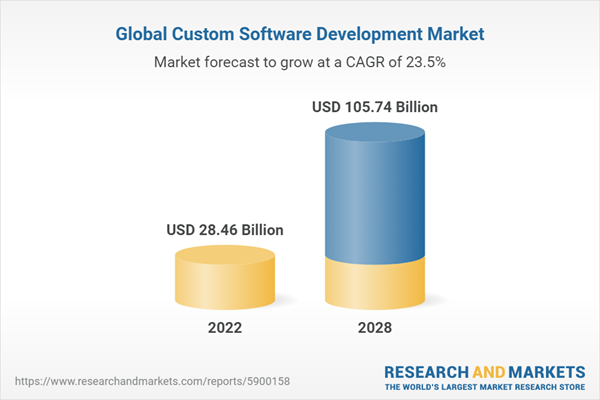Speak directly to the analyst to clarify any post sales queries you may have.
10% Free customizationThis report comes with 10% free customization, enabling you to add data that meets your specific business needs.
One of the primary drivers of this market's growth is the increasing recognition among businesses that off-the-shelf software often falls short in addressing their specific demands. Custom software development offers a personalized approach, enabling companies to design applications, platforms, and systems that align perfectly with their objectives. From small and medium-sized enterprises (SMEs) seeking cost-effective solutions to large corporations with intricate operational needs, custom software caters to a broad spectrum of clients.
Key trends within the Global Custom Software Development Market include a growing emphasis on cloud-based solutions, which provide scalability and flexibility. Additionally, there's a rising demand for mobile app development to reach and engage customers on their preferred devices. The market also reflects an increasing focus on security, with clients requiring robust measures to protect sensitive data.
Challenges in this market include the need for highly skilled developers and the potential for longer development timelines. Moreover, as technology evolves, software must remain up to date, requiring ongoing maintenance and updates.
Key Market Drivers
Digital Transformation Initiatives
Digital transformation has become a top priority for businesses across industries. To stay competitive and relevant in today's digital age, companies are investing heavily in custom software development. They are leveraging software solutions to optimize operations, enhance customer experiences, and create new revenue streams. Custom software enables businesses to adapt to changing market conditions and evolving customer preferences, driving the demand for software development services.Growing Demand for Mobile Applications
The proliferation of smartphones and the increasing reliance on mobile devices have led to a surge in the demand for mobile applications. Businesses recognize the importance of having a strong mobile presence to reach and engage with customers. Custom mobile app development allows companies to tailor their applications to specific user needs, providing a seamless and personalized experience. This mobile app boom is a significant driver for the custom software development market.Emphasis on Data Analytics and Big Data
Data has become a valuable asset for businesses, and there is a growing emphasis on data analytics and big data solutions. Custom software is instrumental in developing data-driven applications and analytics platforms. Organizations use these solutions to gain actionable insights, make informed decisions, and improve their overall performance. The need to harness the power of data is driving the demand for custom software development services.Rapid Technological Advancements
The technology landscape is evolving at an unprecedented pace, with emerging technologies like artificial intelligence (AI), machine learning, blockchain, and the Internet of Things (IoT) gaining prominence. Businesses are eager to leverage these technologies to gain a competitive edge. Custom software development companies play a crucial role in building innovative solutions that incorporate these advanced technologies, meeting the market's demand for cutting-edge software.Increased Focus on User Experience (UX) and Design
User experience (UX) and design have become critical factors in the success of software applications. Users expect intuitive, visually appealing, and user-friendly interfaces. Custom software development allows organizations to prioritize UX and design, tailoring applications to meet the specific preferences of their target audience. As user-centric design gains importance, the demand for custom software services that prioritize UX continues to grow.Key Market Challenges
Rapidly Evolving Technology Landscape
One of the foremost challenges facing the global custom software development market is the ever-changing technology landscape. New programming languages, frameworks, libraries, and development tools emerge regularly, making it crucial for developers to continuously update their skillsets. Keeping pace with these technological advancements is essential to remain competitive, but it also requires significant investments in training and development.Security Concerns and Data Privacy
Security breaches and data privacy violations pose significant challenges to custom software development. With the increasing number of cyber threats and data breaches, organizations must prioritize security in software development. This involves implementing robust security measures, adhering to compliance regulations like GDPR and HIPAA, and staying vigilant against evolving cyber threats. Balancing innovation with security remains an ongoing challenge.Increasing Complexity of Software Projects
As businesses demand more sophisticated and feature-rich software applications, custom software development projects have become increasingly complex. Complex projects often involve large development teams, intricate architectures, and extended development timelines. Managing project complexity, ensuring efficient collaboration among team members, and meeting deadlines without compromising quality are ongoing challenges in the industry.Talent Shortage and Skill Gap
A global shortage of skilled software developers continues to challenge the custom software development market. The demand for highly specialized talent in areas such as AI, blockchain, and cybersecurity far exceeds the available supply. Furthermore, there is a growing gap between traditional software development skills and those required for emerging technologies, making it difficult for organizations to find the right talent for their projects.Cost and Budget Constraints
Budget constraints are a perennial challenge in custom software development. Organizations often have to strike a balance between meeting project requirements and staying within budgetary limits. Cost overruns can lead to financial strain and delays in project delivery. Managing budgets effectively, accurately estimating project costs, and optimizing resource allocation are critical challenges faced by both software development companies and their clients.Key Market Trends
Agile Development Practices Transforming the Landscape
Agile software development methodologies have gained significant traction in the global custom software development market. Businesses are increasingly adopting Agile practices like Scrum and Kanban to enhance collaboration, increase flexibility, and accelerate time-to-market for their custom software projects. This trend is driven by the need to quickly adapt to changing market conditions and customer demands.Rise of Low-Code and No-Code Development Platforms
Low-code and no-code development platforms are revolutionizing custom software development by enabling organizations to build applications with minimal coding effort. These platforms empower business users and citizen developers to create software solutions, reducing the reliance on traditional software developers. This trend is driven by the need for faster development cycles and the shortage of skilled software developers.Cloud-Native Development and Microservices Architecture
The adoption of cloud-native development and microservices architecture is on the rise in the custom software development market. Organizations are leveraging cloud platforms and containerization technologies like Docker and Kubernetes to build scalable, modular, and easily maintainable software solutions. This trend is driven by the desire for greater flexibility, scalability, and cost-efficiency.Focus on User-Centric Design and UX/UI
User-centric design and user experience/user interface (UX/UI) design have become integral parts of custom software development projects. Businesses are placing a strong emphasis on creating software applications that provide an intuitive and engaging user experience. This trend is driven by the need to satisfy end-users and gain a competitive edge in the market.AI and Machine Learning Integration
Artificial intelligence (AI) and machine learning (ML) are increasingly being integrated into custom software solutions to add intelligent capabilities such as predictive analytics, natural language processing, and automation. AI-driven applications are helping businesses make data-driven decisions, automate repetitive tasks, and enhance customer interactions. This trend is driven by the growing availability of AI/ML tools and the potential for improved business outcomes.Segmental Insights
Solution Insights
Mobile App segment dominates in the global Custom Software Development market in 2022. Mobile applications have witnessed explosive growth in recent years, primarily due to the proliferation of smartphones and tablets. As a result, mobile app development has become a dominant force in the custom software development market. Mobile apps serve various purposes, including enhancing customer engagement, improving employee productivity, and expanding market reach. Businesses across industries invest heavily in mobile app development to provide seamless experiences to their customers and stakeholders. Mobile apps also offer unique features like push notifications, GPS integration, and offline access, making them invaluable tools for businesses.Mobile apps offer a direct and highly personalized way to connect with customers, employees, and partners. Whether it's through native apps for iOS and Android or cross-platform solutions, mobile apps have become indispensable tools for achieving business objectives. They enable enhanced user experiences, brand engagement, and real-time data access.
Deployment Insights
Cloud segment dominates in the global Custom Software Development market in 2022. Cloud-based custom software deployment involves hosting the software and its associated data on remote servers managed by third-party cloud service providers. This model offers several benefits, including:
Scalability: Cloud solutions can easily scale up or down to accommodate changing workloads, making them ideal for businesses experiencing growth or fluctuating demands.Cost Efficiency: Cloud services often follow a pay-as-you-go model, allowing businesses to avoid large upfront infrastructure costs and only pay for the resources they use.
Accessibility: Cloud-based software can be accessed from anywhere with an internet connection, providing flexibility for remote work and collaboration.
Automatic Updates: Cloud providers typically handle software updates, ensuring that businesses are always using the latest versions with improved features and security.
Regional Insights
North America dominates the Global Custom Software Development Market in 2022. North America, particularly the United States, has consistently been at the forefront of technological innovations. The region is home to Silicon Valley, which is a global hub for technology companies, startups, and venture capital firms. This environment of innovation and entrepreneurship has fostered the growth of custom software development firms, enabling them to stay ahead in adopting and offering cutting-edge technologies and solutions.North America boasts a robust IT infrastructure, which includes high-speed internet connectivity and advanced data centers. This infrastructure provides a solid foundation for software development and supports the rapid deployment of software solutions. It also facilitates the seamless integration of custom software into existing business processes.
The North American region comprises a significant portion of the global customer base for custom software development services. The presence of numerous large enterprises, across various industries such as finance, healthcare, manufacturing, and technology, generates substantial demand for custom software solutions. These businesses seek tailored software to address their specific needs, compliance requirements, and digital transformation initiatives.
North America has a thriving innovation ecosystem that includes universities, research institutions, and tech incubators. This ecosystem fosters a talent pool of skilled developers, engineers, and technologists. Custom software development companies in North America have access to this talent pool, which is instrumental in delivering high-quality, innovative solutions.
Report Scope:
In this report, the Global Custom Software Development Market has been segmented into the following categories, in addition to the industry trends which have also been detailed below:Custom Software Development Market, By Solution:
- Web-based Solutions
- Mobile App
- Enterprise Software
Custom Software Development Market, By Deployment:
- Cloud
- On-premise
Custom Software Development Market, By Enterprise Size:
- Large Enterprises
- Small & Medium Enterprises (SMEs)
Custom Software Development Market, By End Use:
- BFSI
- Government
- Healthcare
- IT & Telecom
- Manufacturing
- Retail
- Others
Custom Software Development Market, By Region:
- North America
- United States
- Canada
- Mexico
- Europe
- Germany
- France
- United Kingdom
- Italy
- Spain
- South America
- Brazil
- Argentina
- Colombia
- Asia-Pacific
- China
- India
- Japan
- South Korea
- Australia
- Middle East & Africa
- Saudi Arabia
- UAE
- South Africa
Competitive Landscape
Company Profiles: Detailed analysis of the major companies present in the Global Custom Software Development Market.Available Customizations:
Global Custom Software Development Market report with the given market data, the publisher offers customizations according to a company's specific needs.This product will be delivered within 1-3 business days.
Table of Contents
Companies Mentioned
- Accenture plc
- Cognizant Technology Solutions Corporation
- International Business Machines Corporation
- Infosys Limited
- Tata Consultancy Services Limited
- DXC Technology Company
- Capgemini SE
- EPAM Systems Inc.
- NTT Data Corporation
- Atos SE
Table Information
| Report Attribute | Details |
|---|---|
| No. of Pages | 190 |
| Published | October 2023 |
| Forecast Period | 2022 - 2028 |
| Estimated Market Value ( USD | $ 28.46 Billion |
| Forecasted Market Value ( USD | $ 105.74 Billion |
| Compound Annual Growth Rate | 23.4% |
| Regions Covered | Global |
| No. of Companies Mentioned | 10 |









